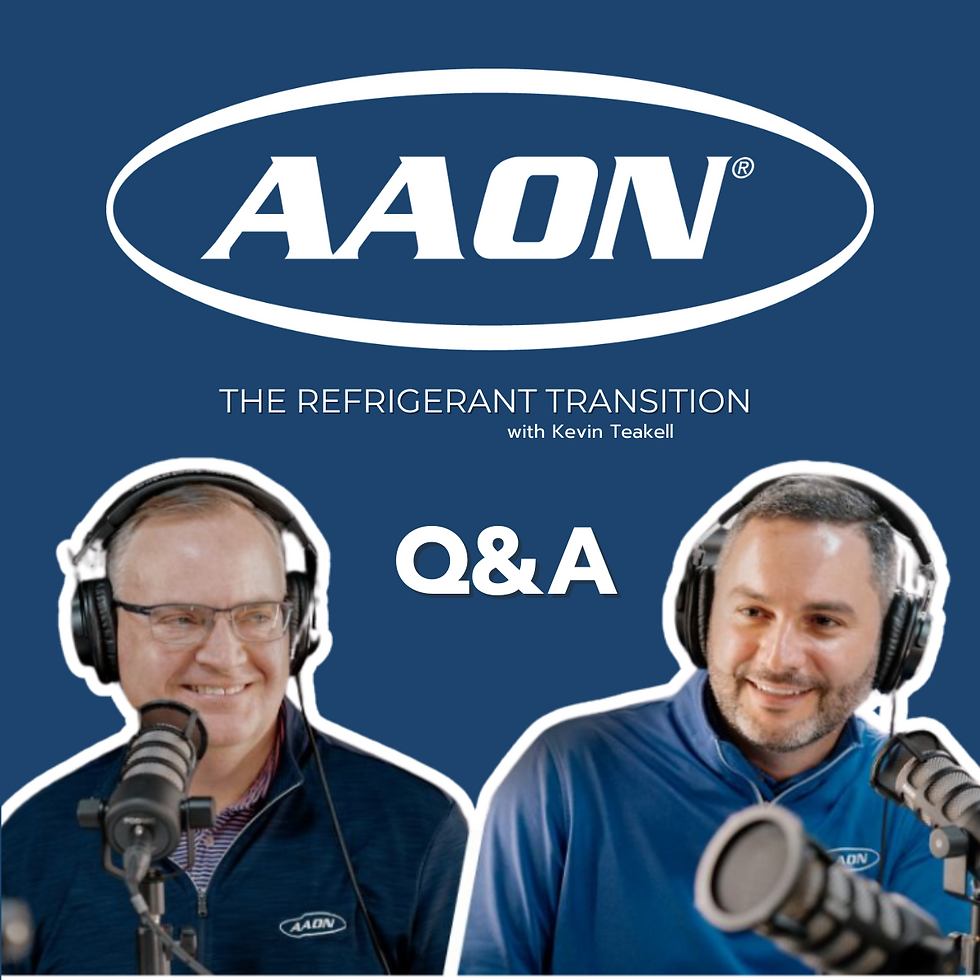The Refrigerant Transition: Expert Insights with Kevin Teakell
- Hobbs & Associates

- Mar 25, 2024
- 3 min read
Updated: Apr 10, 2024

In the ever-evolving landscape of the HVAC industry, professionals and consumers alike are navigating through a significant refrigerant transition, marked by new regulations and changes.
In AAONs recently released podcast, interviewers Dermidio (Derby) Juez Perez and Whitney Tapp sat down with Kevin Teakell, an expert in the industry landscape, to delve into the complexities of this transition.
Here's an insightful Q&A session that sheds light on the subject.
Q: Can you tell us about your role and how it relates to the current refrigerant transition?
A: I head up Government Affairs at AAON, focusing on regulatory changes impacting our industry, including refrigerants and product efficiency. My days are filled with discussions on these regulations, which span chemicals, refrigerants, and more.
Q: For many, this refrigerant transition might be their first. How does this transition compare to previous ones, like the shift to 410A?
A: The transition to 410A was mainly about adapting products to handle higher pressures. This new transition is safety-driven, due to the mildly flammable nature of the new refrigerants, requiring changes in building codes across the industry.
Q: What sparked the need for these refrigerant transitions?
A: The push for change began in the late '80s over concerns about ozone-depleting substances. Recently, the focus shifted towards reducing the global warming potential (GWP) of refrigerants, leading to amendments in the Montreal Protocol.
Q: AAON has already selected its next refrigerant, R454B. Can you explain the rationale behind this choice?
A: We chose R454B over R32 because of its lower GWP and similar performance to 410A, requiring fewer modifications to our existing equipment. This choice aligns with our goal to reduce environmental impact.
Q: With the introduction of mildly flammable refrigerants, what safety measures is AAON implementing?
A: Extensive research and revised safety standards are at the forefront of our approach. New refrigerants like R454B fall into the A2L category, meaning they are non-toxic but mildly flammable, necessitating changes in handling and equipment design.
Q: How do building codes adapt to accommodate new refrigerants?
A: Updating building codes is a complex process, with some states and provinces moving faster than others. Legislation at different levels is required to formally recognize the use of these new refrigerants.
Q: What can industry professionals do to support this transition?
A: Engagement through professional associations like ASHRAE, lobbying, and raising awareness are key. It's crucial for the industry to work together to ensure a smooth transition.
Q: How does the transportation of equipment with these new refrigerants comply with safety regulations?
A: The Department of Transportation has developed permits allowing for the safe transport of equipment containing A2L refrigerants, with specific rules depending on the refrigerant charge size.
Q: Will the new refrigerants impact the performance of HVAC equipment?
A: Our testing shows that R454B's performance is very similar to 410A's, with minor differences in efficiency and capacity, ensuring no significant impact on the consumer.
Q: Finally, Kevin, what does AAON mean to you?
A: Having been with AAON for nearly 28 years, I've found it to be a place of constant challenge and innovation. It's a company where you can make a difference, surrounded by colleagues who have become friends and a culture that values progress and personal connection.
This episode has offered valuable insights into the refrigerant transition, highlighting the industry's efforts to embrace change while maintaining safety and efficiency.
Stay tuned for more discussions that keep you informed and prepared for the future of HVAC.
Want to learn more about the R410A transition?
Listen to this full podcast here: INSIDE AAON - INDUSTRY LANDSCAPE





Comments